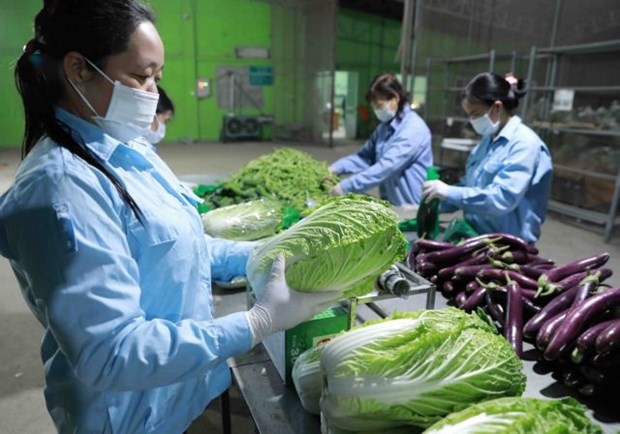Hanoi promotes agricultural product exports
Hanoi is promoting agricultural exports by developing a chain from production to consumption of export agricultural products, according to the city’s Department of Agriculture and Rural Development.

The department said Hanoi now has 35 rice planting areas, 104 vegetable planting areas, 56 fruit tree planting areas, 66 aquaculture areas, and 162 livestock areas.
This is an advantage for Hanoi to become one of the localities with the potential to export key agricultural products.
Hanoi also has 16 coded banana and longan planting areas and four coded packaging facilities with a daily capacity of 30 - 50 tonnes of export products in each facility.
In addition, the capital city also has 1,649 products belonging to the One Commune One Product (OCOP) Programme, including 20 potential five-star products, 1,098 four-star products, and 534 three-star products. They include more than 1,000 food products.
It is one of the favourable conditions for the city's agricultural products to approach strict markets, boosting agricultural exports.
To support businesses and cooperatives in expanding export markets for vegetables and fruits, Deputy Director of the municipal Department of Agriculture and Rural Development Nguyen Ngoc Son said Hanoi needs to continue coordinating with ministries and branches to strengthen connection and promotion activities for the official export of agricultural products.
It will strengthen training courses for agricultural, forestry and fishery production and business establishments on regulations on quality and food safety, and control of imported and exported foods to promote farming produce production and export.
Those courses focus on market information, guidance on registering codes for production areas, and quarantine regulations, as well as import control procedures of the markets of China, the Republic of Korea, and Japan.
Hanoi also will promote information on free trade agreements, including the EVFTA and CTPP, and foreign market barriers to improve the quality of agricultural products, meeting the increasing requirements of the export markets.
Additionally, the city is promoting the development of coded quality and safe specialised farming areas associated with traceability. It also focuses on building brands for key agricultural products, ensuring export standards.
In particular, via the support for the development of cooperatives, Hanoi has built 141 farming produce production chains, including 59 chains producing animal products, and 82 chains producing plant products.
Le Xuan Truong, deputy head of Hanoi's Sub-Department of Cultivation and Plant Protection, said that the city needs to support cooperatives, businesses, and farm owners in applying high technology to the production and processing of key commodities for export.
To do this, it must have policies to encourage and support planting areas and packaging establishments in developing the scale of commodity production under the requirements of the importing countries. In addition, it is necessary to support farmers and cooperatives in applying e-commerce to access potential markets in the world.
Nguyen The Lam, Director of Khanh Phong Agricultural Cooperative in Me Linh district, said if his cooperative participates in training courses on cross-border e-commerce and marketing, it expects to approach more customers.
Lam shared that sometimes, guava can only sell for VND10,000 per kilo, but if this kind of fruit is exported, the selling price is likely to increase, and the pressure on consumption in the harvesting season will also decrease.
Meanwhile, many cooperatives have continued investment in production to increase linkages and expand export opportunities in many forms.
For example, Dong Tam Livestock and Service Cooperative in Quoc Oai district has invested in a closed animal husbandry process. Besides promoting consumption at wholesale markets and exporting directly, the cooperative also provides products for large supermarket systems, such as Coop Mart and AEON.
Especially, the AEON supermarket system is present in many countries, so Hanoi's products appearing at this supermarket system will be an opportunity to approach many foreign consumers.
Dong Phu Organic Agriculture Cooperative in Chuong My district has linked with two businesses to build a chain from production to export for rice products, thereby increasing the value of local rice and income for farmers.
Nguyen Van Minh, Director of Van Duc Agricultural Service Business Cooperative in Gia Lam district, said that Van Duc commune has 220ha of safe vegetables, including 26.9ha of vegetables produced under VietGAP standard.
Now, besides supplying supermarkets, wholesale markets and neighbouring provinces, the cooperative has also exported 300-500 tonnes of safe vegetables each year to Taiwan (China) and the Republic of Korea.
Dai Thanh Agricultural Cooperative in Quoc Oai district is developing 160ha of planting fruit trees according to VietGAP production standards, including 115ha growing longan.
Therefore, Dai Hoang late ripening longan is not only a specialty of Hanoi market, but also consumed at supermarket systems and exported to the Republic of Korea, Malaysia, the US and Poland.
According to the Hanoi Department of Agriculture and Rural Development, Hanoi's agro-forestry-aquatic product export value reached US$1.75 billion in 2022. Of which, the export value of agricultural products and foods reach US$871 million, up 12.2% on year; and timber and wood product export value was US$883 million, up 17.5%.
